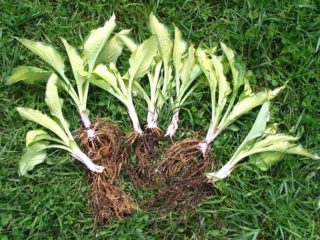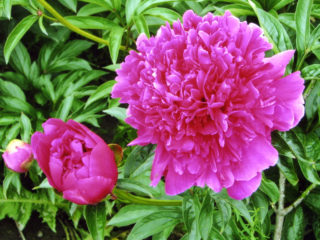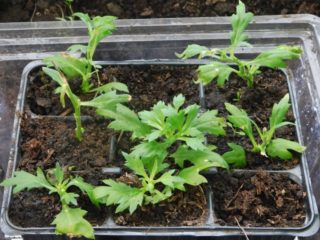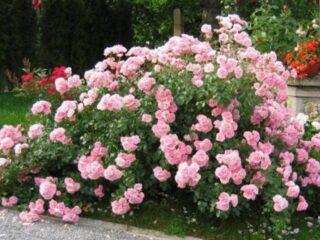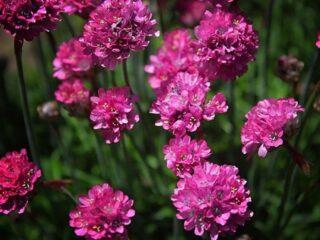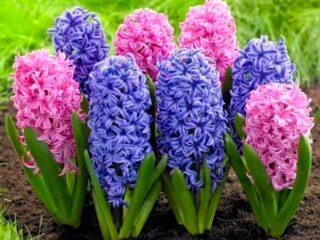Content
- 1 Is it necessary to mulch roses in open ground?
- 2 When to mulch roses
- 3 Which mulch is best for roses?
- 3.1 Organic materials
- 3.1.1 Straw and hay
- 3.1.2 Compost
- 3.1.3 Leaf litter
- 3.1.4 Pine cones
- 3.1.5 Fresh grass
- 3.1.6 Eggshell
- 3.1.7 Bonfire
- 3.1.8 Is it possible to mulch roses with peat?
- 3.1.9 Is it possible to mulch roses with sawdust?
- 3.1.10 Is it possible to mulch roses with pine litter?
- 3.1.11 Is it possible to mulch roses with pine bark?
- 3.1.12 Is it possible to mulch roses with manure?
- 3.2 Industrial materials
- 3.1 Organic materials
- 4 Proper mulching
- 5 Care after mulching
- 6 Conclusion
The dream of any owner of a personal plot is a well-groomed rose garden with lush flower buds and shiny emerald foliage. The desire can be realized provided that the plantings are properly cared for. To make daily gardening work easier, experienced gardeners recommend mulching roses.
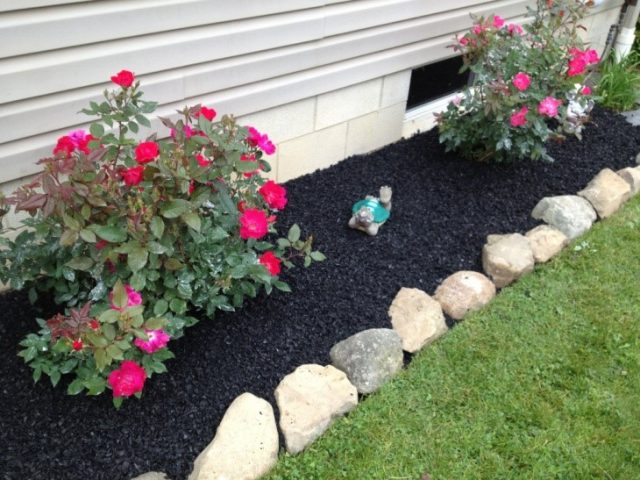
Rose belongs to the category of crops that especially need favorable external conditions
Is it necessary to mulch roses in open ground?
Mulching the soil is one of the effective agricultural practices. The procedure consists of creating a cover for the surface of the earth in the bite area with a layer of materials with a certain composition. The soil in the garden areas is depleted over the years. Mulch enriches the soil in the rose garden with elements necessary for the full development of plants. In addition, mulching helps solve a whole range of problems:
- retains moisture, preventing its evaporation;
- improves drainage of heavy (clay) soil;
- accelerates the process of decomposition of organic substances;
- makes it difficult for weeds to germinate;
- does not allow the top layer of soil to compact;
- reduces the harmful effects of fungal organisms;
- prevents the spread of nematodes;
- protects the root system of roses from unfavorable temperature factors (overheating and freezing).
Rose plantings in mulched areas rarely suffer from infectious diseases. Agricultural technicians advise mulching the soil in case of pathological reproduction of insects, since thanks to the procedure, plants are more protected from the negative effects of pests.
When to mulch roses
The schedule for the procedure plays an important role in maintaining the health of the rose garden. It is better to mulch roses in late spring or summer, when the first fertilizing is done. Pre-organize weeding and loosening of the soil. In the summer months, mulch will protect pink plantings from exposure to hot sun rays and will retain moisture.
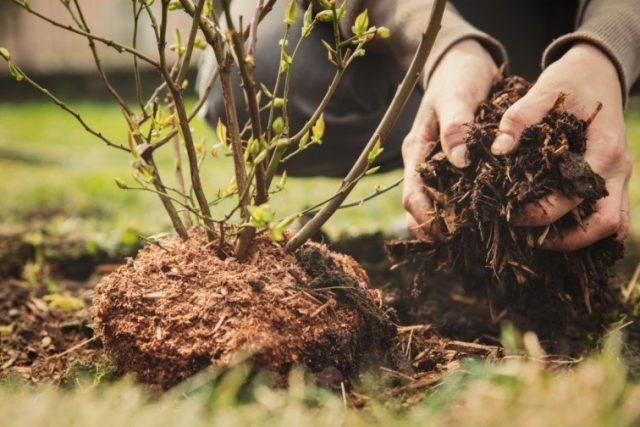
Spring mulching of roses is carried out after pruning the rose bushes
Before mulching roses, weeds are cut down in the fall. In the future, the mowed biomass can serve as an organic material for mulch; it is mixed with the soil during loosening. Mulching roses for the winter best protects plant roots from frost until a stable snow cover is formed.
Which mulch is best for roses?
Mulch can be of organic or inorganic origin. There are different opinions about which mulch is most suitable for roses.It is important to understand the benefits of the various materials used to cover the soil in rose gardens.
Organic materials
Traditionally, gardening uses organic matter to mulch the soil. Natural components not only maintain a soil regime favorable for roses, but also enrich the garden area with useful elements. A significant advantage of organics can be considered the fact that most covering materials are given to land users practically for nothing.
Straw and hay
Dry stems of herbaceous plants are rich in nutrients. When mulched, loose material does not allow the top soil layer to dry out and maintains optimal temperature conditions, preventing rose roots from overheating or freezing. A significant disadvantage is that mulch made from hay and straw often becomes a haven for mice. Rodents damage rose bushes. In addition, the decorative qualities of dry grass scattered on the ground are questionable.
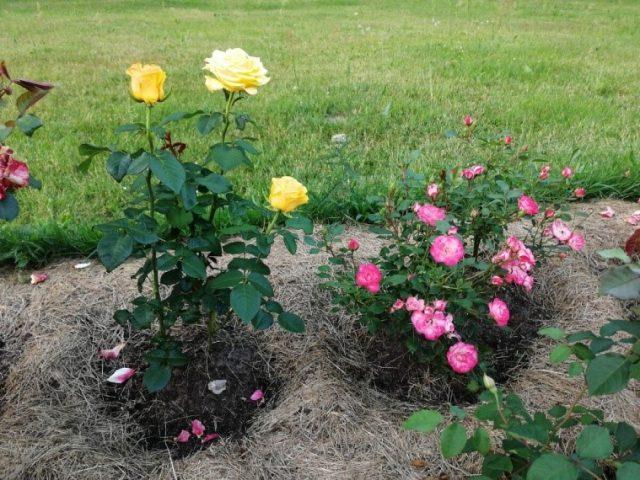
Straw and hay are used in case of night frosts, which can destroy rose bushes
Compost
Mulching rose gardens with compost is very common among home garden owners. Rotted remains of organic matter as a covering material have a complex effect:
- saturate the soil;
- prevent soil erosion;
- provide optimal humidity levels;
- protect the root system of roses from temperature changes.
When covering roses with compost mulch, a serious problem can arise - infection with pathogenic spores. For this reason, it is important to “cook” the compost correctly: maintain sufficient time at a temperature of 28 to 35 0WITH.
Microorganisms in the compost heap, with an influx of oxygen and moisture, ensure the decomposition of the components.
Leaf litter
When mulched, fallen leaves form a voluminous loose layer. The foliage allows air to pass through well and provides the necessary microclimate to protect the roots of roses. The disadvantage is that larvae hide in the leaves and there are eggs of insects harmful to rose plantings. Also, in rainy weather, the foliage becomes compressed and may become moldy.
Pine cones
Cones from pine and spruce trees create excellent soil aeration and protection against erosion. The antiseptic substances contained in the resin of coniferous trees help maintain the health of rose bushes and repel harmful insects. In addition to the indicated beneficial qualities, cones are an excellent decorative material.
The disadvantage of mulching material is the lack of useful nutrients. Therefore, it makes no sense to use cones as a fertilizer for roses.
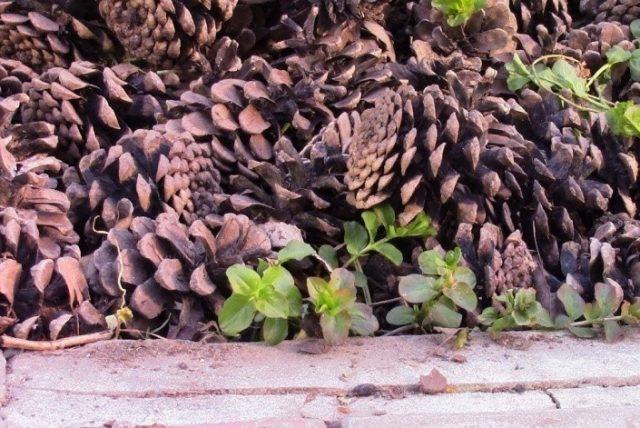
The territory of the rose garden, mulched with a scattering of pine cones, looks very nice
Fresh grass
Freshly cut grass enriches the soil with nitrogen. The useful element helps to increase the green mass of rose bushes. Mulching with fresh grass is best done in May-June.
Eggshell
Perhaps the most readily available material for mulching is crushed egg shells.It contains 27 microelements, with over 90% of the composition being calcium carbonate. In addition to the fact that eggshells are considered a good fertilizer for rose plantings, they serve to reduce acidity and improve soil drainage.
Bonfire
The most valuable organic material is brome. This is a product of hemp and flax processing. Kostya, consisting of cellulose, in addition to retaining moisture in the ground, is considered a natural fertilizer. Covering roses with flax and hemp mulch for the winter helps enrich the soil and preserve insects beneficial to plants.
Is it possible to mulch roses with peat?
A common option is mulching with peat. The loose rock is formed by an accumulation of decomposed moss.
The substance has many advantages:
- does not cake;
- does not accumulate moisture;
- allows oxygen and liquid to pass through;
- is a good feed for roses.
But given that water accumulates on the peat crust without getting to the root system of plants, when watering roses you should rake out the mulch. Another way to use organic matter is to spread peat over the ground in a thin layer.
Summer mulching protects the roots of rose bushes from overheating. It is customary to mulch roses with peat for the winter to provide reliable protection against soil freezing and leaching of nutrients.
Natural material differs in mineral content and acidity level. The composition of peat depends on the place where it was taken.In fresh and unaerated peat, the concentration of elements that have a toxic effect on flower crops may be increased.
Is it possible to mulch roses with sawdust?
Sawdust is often used to mulch a rose garden. Small chips allow moisture to pass through well, preventing it from evaporating, and prevents the formation of crust on the soil. At the same time, sawdust increases the acidity of the soil. Excessively moistened wood substrate begins to rot and mold. It is recommended to mulch roses with sawdust for the winter if low rainfall is expected in the long-term forecast.
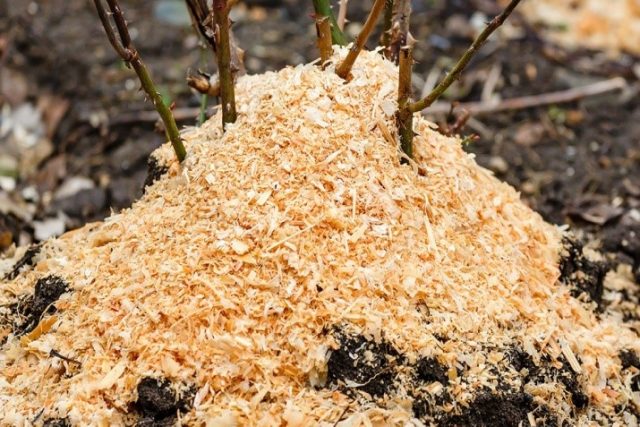
Large shavings prevent the ground from icing up and the roots of roses from dying
Is it possible to mulch roses with pine litter?
Fallen needles act on flowers as an antiseptic. Many pests are repelled by the pine aroma; for slugs, prickly needles become a serious obstacle. The soil covered with pine needles does not overheat or freeze, and air flows freely to the root system of roses.
The disadvantage of pine litter is that it acidifies the soil. The exception is soft larch needles, but this tree species is considered rare in most regions.
Is it possible to mulch roses with pine bark?
Mulching rose plantings with pine bark is a good way to cover the soil and decorate the garden. The bark allows air and water to pass through without accumulating moisture or caking. However, it should be taken into account that the material slightly oxidizes the earth and may contain substances that negatively affect plantings.Agrotechnicians believe that it is better to mulch roses with larch bark, which contains useful antioxidants that disinfect the soil.
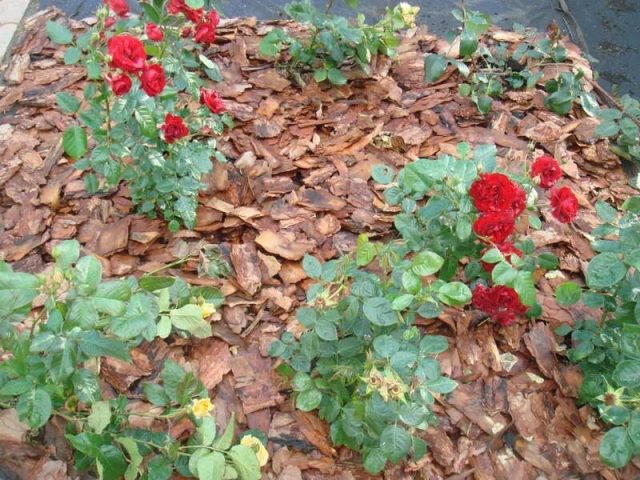
Larch bark does not affect the acidity of the area
Is it possible to mulch roses with manure?
The rotted organic matter that manure consists of has a positive effect on the structure of plant tissues. Manure mulch saturates roses with nitrogen and retains liquid in the soil. Excess cow or horse manure can negatively affect the health of rose bushes. There are cases when, when mulching with manure, weed seeds get into the plantings.
Industrial materials
Inorganic materials have no effect on soil chemistry. Non-woven fabric is used to protect pink plantings:
- agril;
- spunbond;
- agrospan;
- spanbel;
- lutrasil.
Other industrial materials are also successfully used. Working with non-woven protective fabrics is not difficult: the garden sector is covered with a measuring rag. Purchasing industrial materials requires certain costs. If mulching is planned on several acres of land, then the cost of shelter for roses can be significant.
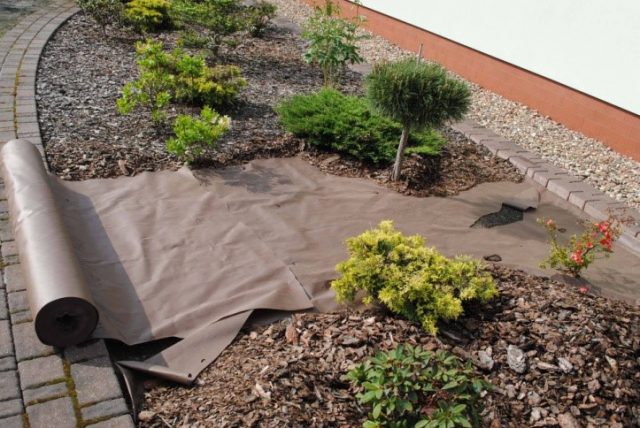
In a sheltered area, the soil temperature will rise several degrees
Modern gardeners are increasingly using inorganic materials to protect the soil in rose gardens. In addition to fabric, these can be:
- crushed stone;
- gravel;
- pebbles;
- expanded clay;
- river and sea shells;
- coarse sand.
Thanks to the layer of natural materials, fewer weeds grow on the site. In addition, the stones accumulate heat, which is especially useful for delicate roses in the spring.
Inorganic mulch is a decorative element used in the design of a personal plot.
Practical experience confirms that rose plantings together withstand adverse weather conditions much better.
Proper mulching
Regardless of what material is used to mulch roses, it is important to follow certain rules when organizing the work. Then the procedure will benefit flower plantings.
Basic recommendations:
- Before adding mulch, the area is cleared of weeds and the soil is loosened;
- on heavy soils, mulching compounds are distributed in a thin layer to prevent problems with ground ventilation;
- Contact of mulch with plant stems should not be allowed in order to prevent plant rotting from excess moisture.
When working in the garden in spring, mulch is scattered after it dries. Otherwise, the root system of roses may suffer from putrefactive processes.
Care after mulching
Caring for roses after mulching becomes much easier. There is no need to weed, and the amount of irrigation is reduced, since moisture is retained in the soil. If organic substances are used as mulch, then the plant is not fed with fertilizers for some time. Only pruning of shoots remains at the same level. A properly carried out soil mulching procedure ensures the good condition of roses in flower beds, edgings and other landscape forms.
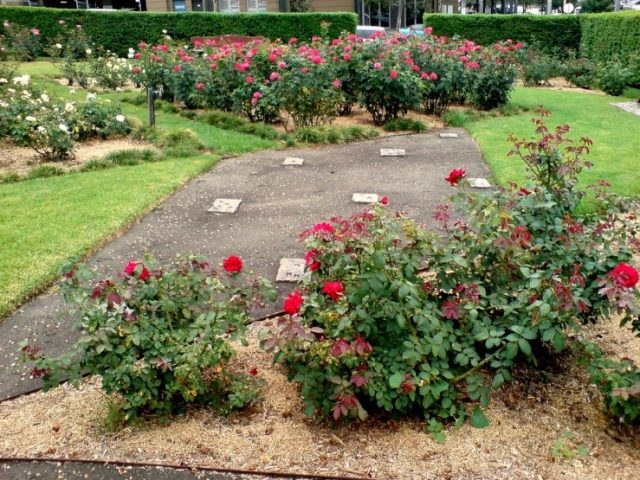
After mulching, rose bushes are watered 2-3 times less often
Conclusion
It is necessary to mulch roses to make the flower garden look presentable.Bushes grown in protected conditions are distinguished by their health and lush color. An important factor for gardeners is the simplification of the work of caring for plantings after mulching the land.
